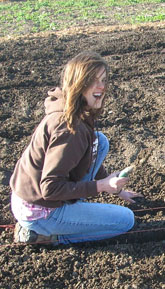
“You don’t have a garden just for yourself. You have it to share.”
– Augusta Carter
Hello, my name is Bailey Hallwachs. I am a recent addition and very proud to represent the College of Agriculture and Natural Resources as an Agriculture Ambassador.
I share the quote above because it both represents what I am pursuing in life but also is a reflection to me the meaning behind the role of Ag Ambassador. We share with the broader public what this particular department represents. As a garden is imbued with life, flourishing and ever changing as to is the College of Agriculture. A garden is a source of sustenance and inspiration imbibed with knowledge and cohesive connections of a complex ecosystem. So too is the College of Ag from the internal foundations of administration, donors and business to the educators through professors to students and those who maintain the durability of our sanctuary.
As a student within Plant Sciences I think about the interworking connections of many systems especially that of agroecosystem. I am currently transitioning into my senior year while now one step away from obtaining a degree in Agroecology with a minor in Horticulture. I transferred from Laramie Country Community College in Cheyenne to the University of Wyoming in fall of 2011. This transition was not the easiest but those who made it truly possible are from the College of Ag. Although many people helped to ensure my success those I would like to highlight are Dr. Dean Galey, Ms. Anne Leonard, Ms. Kelly Wiseman, my advisor Dr. Stephen Herbert and Dr. Karen Panter. I could keep naming people but the point of the matter is the College of Agriculture and Natural Resources as a whole is truly invested in their students, believe in their potential and their ability to contribute to the agriculture industry. That most certainly made all the difference. The doors opened to my ability to first and foremost attend the University and second my progress and success at academics. To start off my year as a College of Ag and Natural Resources Ambassador I would like to reflect and impart the deep appreciation I have for this department. Thank you to all those who make a difference in students’ lives each and everyday.
This summer has started off right. I received an EpSCOR Undergraduate Research Fellowship grant to conduct summer research on grape cultivars. I am currently working under the assistantship and advisement of Dr. Sadanad Dhekney at the Sheridan Community College Agriculture Department. My particular role in the research is to study the transformation effects of various co-cultivation treatments on embryo necrosis and antioxidant treatments for reducing necrosis in grapes. Currently in the lab there are two undergraduate students Andrea Lage de Oliveria from Brazil who is also majoring in Agroecology and one Masters student, Raju Kandel from Nepal working toward his Ph.D in Horticulture breeding and biotechnology through this research. Together we are all working with biotechnology to develop grapes that are able to grow in the challenging environments of Wyoming including drought climate conditions and salt soils. The primary areas of study include: horticulture, tissue culture and molecular biology. The outlined goals of our research this summer were presented by Dr. Dhekney in our initial ‘kick off the summer’ meeting:
- Micropropagation of 35-40 varieties of grapevines.
- Embryogenesis
- Transformation (my research)
- Field Screening
- High Tunnel
- Molecular studies of drought and salt tolerances.
In combination with detailed laboratory work we will also be establishing a test vineyard with approximately 40different grape cultivar varieties with an average of 300 plants in total. The field will be located at the Sheridan Community College next to the (currently being renovated) agriculture research facilities. As a team we are passionate to make advances towards providing alternative crops to Wyoming agriculture industries which could extend upon our borders to help other potential producers with matching challenges. Our work will be displayed at the Agriculture Field Day on June 15, 2013 located at the Sheridan Community College.
I am so enthusiastic to be a part of such research. I cannot believe how much I have already learned and it has only been 3 days. The skills that I will learn this summer will help me to pursue a path not just in research but in my ultimate goal of becoming a Director of a Botanical Gardens. Here is one example, I have learned to micropropagate plant material. This technique enables plant propagators to obtain disease free plant material thorough excision of the apical meristem, surface sterilization with common bleach and several Deionized water washes. In my case notes Dr. Dhekney, these techniques will help to increase or maintain the supply of rare or endangered plant species. In addition, the “grape team” as we call ourselves has learned how to prepare several different medium that contain the essential nutrients needed to maintain a grape plant while fulfilling a variety of experimental protocols. Furthermore, we have learned technologies of somatic embryogenesis, organogenesis, vegetative propagation of grapes, and maintenance of grapes in a greenhouse environment. On top of it all we have been presented with some challenges. We are conducting sensitive research in what was previously a math class in the Science building due to the renovation of the current facilities. Too boot, we are sharing Dr. Bergys research lab/classroom. Dr. Dhekney is also currently in Egypt for with a week with regards to the topic of regional grape growing assistantship. This leaves the grape team to be responsible, efficient in experiments and on top of maintaining the laboratory environment while our advisor is away.
The grape team has also secured a community garden plot that is conveniently located inbetween both the current research facilities and future facilities. Raju, Andrea and I have taken the strenuous effort to rototill the plot 3 times over. We will be planting all different varieties of short and long season vegetables. We want to have access to fresh food now while providing an abundant end of the year harvest to store for the Wyoming winter months. I also believe that community gardens are the root of forming strong bonds between individuals from different backgrounds as we come together to share our joy and love for the science, wisdom and art behind gardening. It will be beneficial for us as novice gardeners to increase our knowledge of growing in a variety of settings. I am excited to share this journey with fellow international students as they are able to share with me the knowledge they have learned from their backgrounds to growing and I with mine. Even though it has been three short days I have learned so much from spending time in the community garden with others. On the one hand, I have been able to engage in the social aspect of meeting members of the community such as the local Girl Scout troops who are current growers. On the other hand, the initial technical steps of planning and preparing the plot.
This summer is off to a great start. I will also be traveling with other members of ACRES Student Farm to be panel presenters at EARTH PERFECT? NATURE, UTOPIA and the GARDEN symposium at the University of Delaware, June 6-9, 2013. This is fantastic opportunity has been made available through funding support of ASUW and College of Agriculture and Natural Resources SEND grant donors. To extend beyond our borders to be engaged in conferences such as this allows for ourselves to have a more enriching college experiences while further aiding our professional development within the fields of horticulture and agriculture. We will have the opportunity to talk about our role within the Laramie community on a variety of topics and projects ACRES directs. In addition to our presentation we will attend presentations of keynote horticulturalists and tour several prestigious gardens associated with the University of Delaware. Here is an abstract of our presentation listed in the 29 page long list of panel presenters at the symposium.
Agricultural Community Resources for Everyday Sustainability: A Student Farm Exemplifies Community Agriculture and Sharing Agricultural Community Resources for Everyday Sustainability (ACRES) Student Farm is located on a 1.8 acre plot of land that University of Wyoming (UW) students converted into a vegetable farm in 2007. During the pioneering stages, ACRES relied on support from UW and the community, but it has grown to finance itself with income from weekly participation in local farmers’ markets, Community Supported Agriculture (CSA) programs, compost sales, and partnerships with UW and several local businesses. Driven by students, the nature of the workforce at ACRES is transient. This has allowed for constant influxes of fresh knowledge and skillsets, valuable resources which have been shared with the community. ACRES encourages support from volunteers within the local community and often hosts field trips for local schools, businesses and interest groups. The open, reciprocal relationship between ACRES and the community has resulted in a movement of local support. All of these factors have allowed ACRES to increase the local food economy and serve as an educational tool for the community. ACRES also serves as a research site, having received research grants for efforts to increase crop diversity and extend the growing season in an extreme climate. Not only does this paper aim to highlight the importance of community agriculture and resource sharing, but it hopes to demonstrate a model that can be used for student farms in other areas. Case studies and specific resource sharing activities are discussed to provide examples of how this model can be employed.
